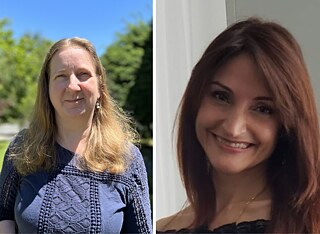Can you tell us a bit about your school district and how long you’ve partnered with GAPP?
Anahita: Our district is located in Old Bridge township in New Jersey, about 35 miles from New York City. We have eleven elementary schools, two middle schools, and one large high school. We teach five different languages district-wide, including German, Italian, French, Chinese, and Spanish.
Brita: We do a number of foreign exchanges now, but we are proud to say that GAPP was our first. Our program started in 2013, and I took over in 2015. We’re currently partnered with Steinbart-Gymnasium in Duisburg.
When you take students to Germany, what does your typical itinerary look like?
Brita: We try to vary the activities each time, but we always have a few “must do’s.” Every student wants to see Berlin, so we always take a trip there. We also make sure to see a castle; so many Americans have never seen a medieval castle in person. Overall, we are always trying to do something new as well.
From what you’ve seen, what are the biggest differences students notice between U.S. and German school systems?
Anahita: For the students we take to Germany, I think the level of independence always strikes them. American students are used to such a stringent level of restriction: you can’t be in the halls, you can’t leave the premises, you have no agency really. German students can go across the street for lunch, and no one thinks “oh no, what is going to happen to this child?” I think it's fascinating to see and important for students to learn to take on that responsibility.
Brita: For German exchange students, the first thing that comes to mind is the classic yellow school bus. School buses look like regular public transport in Germany, so when students see these bright yellow school buses they usually say, “Oh my god, it's just like in the movies!”
What are the parts of Germany students seem to enjoy the most?
Brita: I think the freedom they have to just go anywhere, and how simple it is to do so. With German public transportation, you can easily get where you want to go, and the cities are very walkable. So they can just take a train, bus, or walk to a friend's house, and they don’t get in trouble, because they're treated like adults. I find that students often bring that attitude back with them to the U.S., and they tend to have a higher level of maturity and confidence.
What impact do you believe a GAPP exchange can have on an American student?
Anahita: I think it really helps get students outside of their comfort zone. I remember one participant we had, he was worried about the exchange. Now he’s getting his MBA in England. He reached out and thanked me for his experience, saying it was the reason he’s decided to travel to so many different countries. It makes me so happy to think that we can instill students with that confidence and help them become more aware of the world outside of the U.S.
Do you believe the impact is different for a German student?
Brita: Yes; it's good for German students to come to the U.S. and see the country outside the movies. They get to connect on a human level with the people here and find out so many things they never would have learned back home. There are so many stereotypes about Americans that get broken down by the connections students get to form through GAPP.
What advice would you give to a student considering taking a GAPP exchange?
Anahita: I would say it's not even an option; You have to do it. If you are preparing for the next five or ten years of your life, travel is essential. It will help you build confidence, and you’ll learn that there is a whole world out there to see and experience.
Brita: Nothing replaces actually going somewhere. You can watch videos and write to pen pals, but nothing is better than face-to-face interaction and seeing a place in person. It will absolutely change your life.
